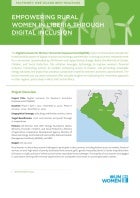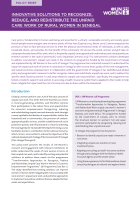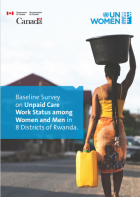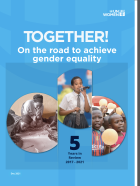1 - 7 of 7 Results
Date:
This publication is part of the WEE WCARO Best Practices series. The Digital Inclusion for Women’s Economic Empowerment (D4WEE) project in Liberia demonstrates the transformative power of digital inclusion and strategic partnerships in driving economic empowerment for rural women. Rural women face challenges to participate in the economy, including limited access to markets, financial services, or land. By connecting women to markets, enhancing access to finance, and promoting renewable energy solutions, the project leverages technology to improve women’s financial inclusion.
Date:
This policy note presents the results of the assessment of the needs of rural women, carried out as part of the 3R Programme in Senegal, and namely the unpaid-care work related needs faced by rural women, along with the innovative solutions and policy measures needed to address these needs and recognize, reduce, and redistribute rural women's unpaid care work.
Date:
The baseline survey on unpaid care work status among women and men in eight districts of Rwanda seeks to understand the care-related dynamics in households, this study utilized both quantitative and qualitative research methodologies. Drawing on Oxfam’s Household Care Survey (HCS) and the Harvard Analytical Framework (also referred to as the Gender Roles Framework). The survey helps to understand how women, men and children spend their time, how care activities are distributed in the household and the access that households have to basic public services and infrastructure that facilitate their everyday survival. The study also explored the social norms that shape power relations and gender division of care labor.
Date:
The five years in review publication captures the progress made from 2017 to 2021 across its different focus areas: Leadership and Political Participation, Women’s Economic Empowerment, Ending Violence Against Women, Data and Statistics, HIV/AIDS and the response to the unfolding crisis caused by the COVID-19 pandemic.
Date:
This publication shows preliminary results and promising practices to support women’s economic empowerment and strengthen resilience in rural areas by promoting women’s access to land, finance, skills and technology for climate resilience and markets in West and Central Africa.
Date:
This report was produced by UN Women following the global digital consultation on the gendered dimensions of violent extremism and counterterrorism responses (25 May – 5 July 2020), organized on behalf of the Gender Working Group of the UN Global Counter-Terrorism Coordination Compact. It reflects the views expressed by civil society participants in the consultation, and it was presented to Member States ahead of the 7th UN Global Counter-Terrorism Strategy revision, 2021.
Date:
This is a convening report for the Regional Sharefair on Gender and Resilience in Africa held by UN Women in collaboration with key partners in November 9th –10th 2016 at Safari Park Hotel, Nairobi, Kenya. Focusing on the main theme of “Strengthening Resilience by Empowering Women”, the Sharefair provided a platform for sharing and learning, availed an opportunity to further explore the role of women in building and strengthening resilience and promoted dialogue and sharing of experiences on gender responsive resilience related programmes and policies in Africa. This is expected to accelerate development and humanitarian response and the overall achievement of the Sustainable Development Goals (SDGs). The Sharefair also endeavor to facilitate long term collaboration amongst regional stakeholders with the aim of identifying problems, using data and predictive methods and mobilizing support and resources to incubate, accelerate and scale effective solutions. The outcome of the two-day event was the creation of a strong regional network to amplify resilience solutions, sustaining change in policy and practice within relevant macroeconomic frameworks. Hundreds of participants gathered at the Sharefair to discuss interventions, innovations, good practices, evidence from research and documented data, legal frameworks and policies.







